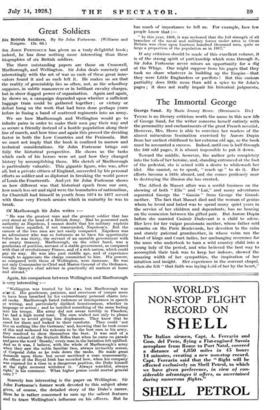Great Soldiers
SIR JOHN FORTESCUE has given us a truly delightful book ; indeed, he has done nothing more interesting than these
biographies of six British soldiers.
The three outstanding papers are those on Cromwell, Marlboiough, and Wellington. Sir John deals concisely and interestingly with the art of war as each of these great inno- vators found it and as each left it. He makes us see that the reality_ of generalship lies so often, not, as the schoolboy suppciies, in subtle 'manoeuvre or in brilliant cavaliy charges, but in sheer dogged power of organization. Again and again, he shows us, a campaign depended upon whether a sufficient
baggage train could' be gathered together ; or victory or defeat hung on the work that had been done perhaps years before in fusing a band of scattered regiments into an army.
We see how Marlborough and Wellington would go to infinite pains in order to make their men pay their way and so secure a friendly instead of a hostile population along their line of march, and how time and again this proved the deciding factor in both the Low Countries and the Peninsula. But we must not imply that the book is confined to narrow and teelmical considerations. Sir John Fortescue brings out fully the historical perspective. He shows us the tasks which each of his heroes were set and how they changed history by accomplishing them. His sketch of Marlborough is particularly valuable. This gigantic figure, who was, after all, but a private citizen of England, succeeded by his personal efforts as soldier and as diplomat in breaking the world power of Louis the Fourteenth. And yet Sir John Fortescue shows us how different was that historical epoch from our own, how much less set and rigid were the boundaries of nationalism, for Churchill had himself in youth from 1674 to 1677 served with these very French armies which in maturity he was to break.
Of Marlborough Sir John writes :--
`, He was the greatest man and the greatest soldier that has ever stood at the head of a British Army. Had he possessed such authority as Napoleon, I cannot doubt that his military exploits would have equalled, if not transcended, Napoleon's. But the careers of the two men are not easily compared. Napoleon was an adventurer who was so fortunate as to have his opportunity before he was thirty, the servant of an unstable government with an empty treasury. Marlborough, on the other hand, was a gentleman of position, servant of a stable government, as compared with that of revolutionary France, and of a rich nation, which could pay its way. He was also past middle age, and of experience enough to appreciate the charge committed to him. His powers, as compared with those of Wellington, were immense. He was not only Commander-in-Chief and Master-General of the Ordnance, but the Queen's chief adviser in practically all matters at home
and abroad." •
Again, his comparison between Wellington and Marlborough is very interesting :-
"Wellington was trusted by his n- *a, but Marlborough was actor I. His gentleness, patience, and sweetness of temper seem to have been breathed by his extraordinary personal charm into all ranks. Marlborough hated rudeness or intemperance in speech or writing, and particularly disliked licentiousness, whether in language or action ; and he instilled something of the same feeling into his troops. His army did not swear terribly in Flanders, tut had a high moral tone. The men wished not only to please him, but to avoid giving him displeasure. They knew that he eared for them and looked to their comforts. They could ' not live on nothing like the Germans,' and, knowing that he took count of this and reckoned his redcoats to be the beat men in his army, they resolved to 'show themselves the best. It was said of a famous colonel of the Sixtieth Rifles that when he came on parade and gave the word ' Steady,' every man in the battalion felt uplifted. And so it was, I believe, with the whole of Marlborough's army when they saw the noble familiar face, always invincibly serene, of Corporal John as be rode down the ranks. He made great demands upon them. but never sacrificed a man unnecessarily. An officer of the Royal Irish has recorded how, when his company was exposed for a time in a dangerous position, the Duke himself at the right moment withdrew it. ' Always watchful, always right,' is his comment. What higher praise could mortal general earn ? "
Scarcely less interesting is the paper on Wellington. Sir John Fortescue's former work devoted to this subject alone gives, of course, the detailed story of the Duke's career. Here he is rather concerned to sum up the salient features and to trace Wellington's influence on his officers. But he has much of importance to tell us. For example, how few people know that :—
" In this year, 1808, it was reckoned that the full strength of all branches of the naval and military forces under arms in Great Britain was close upon fourteen hundred thousand men, quite as large a proportion of the population as in 1917."
If any criticism should be made of this excellent volume, it is of the strong spirit of partizanship which runs through it. Sir John Fortescue never misses an opportunity for a dig at the Whigs. One might suppose from his pages that they took no share whatever in building up the Empire—that they were Little Englanders or pacifists ! But this curious partiality does little more than add a spice to Sir John's pages ; it does not really impair his historical judgments.




































 Previous page
Previous page